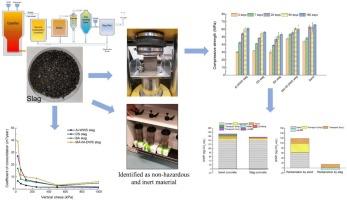高温炉渣联合气化工艺产生的污泥衍生炉渣作为可持续建筑材料的技术和环境评估
IF 7.1
2区 环境科学与生态学
Q1 ENGINEERING, ENVIRONMENTAL
引用次数: 0
摘要
淡水处理或污水处理每年会产生大量污泥。高温炉渣共气化将污泥转化为炉渣,显示出其作为建筑材料应用的潜力。本研究全面分析了城市固体废弃物(MSW)与淡水处理或污水处理产生的污泥以及污泥焚烧产生的灰烬共同气化产生的 4 种炉渣的物理化学性质。根据毒性特征浸出程序 (TCLP)、批量浸出和柱浸出试验确定的污泥衍生炉渣和灰泥(以炉渣为细骨料)的浸出性能表明,炉渣可以安全地再利用。抗压强度测试表明,灰泥性能优异,有可能在混凝土生产中取代砂。矿渣的固结系数(1.6 - 39.1 平方米/年)低于砂质粉土,但高于粘土。此外,矿渣的渗透系数(∼1.96 × 10-3 m/s)、抗剪角(∼39°)和排水剪切强度(375.5 ± 54.8 kPa)与砂相当。此外,还进行了生命周期评估(LCA),以评价将污泥产生的炉渣作为混凝土生产和土地复垦的替代材料进行再利用的环境影响和效益。本文章由计算机程序翻译,如有差异,请以英文原文为准。

Technical and environmental assessment of sludge-derived slag generated from high temperature slagging co-gasification process as a sustainable construction material
Tremendous amount of sludge is generated annually from freshwater treatment or sewage. The high temperature slagging co-gasification converts the sludge to slag showing the potential application for construction material. In this study, the physico-chemical properties of 4 types of slags generated from the co-gasification of municipal solid waste (MSW) with sludge from freshwater treatment or sewage, and ashes from sludge incineration are comprehensively analyzed. Leaching performance of the sludge-derived slag and mortar (with slag as the fine aggregate), as determined based on Toxicity Characteristic Leaching Procedure (TCLP), batch leaching and column leaching tests, indicates the slag can be considered safe for reutilization. Compressive strength test demonstrates that the mortars perform excellently and have the potential to replace sand in concrete production. The consolidation coefficient of slag (1.6 – 39.1 m2/year) is lower than the sandy silt but higher than clay. Additionally, the coefficient of permeability (∼1.96 × 10-3 m/s), angle of shearing resistance (∼39°), and undrained shear strength (375.5 54.8 kPa) of the slag are comparable to sand. The life cycle assessment (LCA) is also conducted to evaluate the environmental impacts and benefits of reutilizing sludge-derived slag as an alternative material for concrete production and land reclamation.
求助全文
通过发布文献求助,成功后即可免费获取论文全文。
去求助
来源期刊

Waste management
环境科学-工程:环境
CiteScore
15.60
自引率
6.20%
发文量
492
审稿时长
39 days
期刊介绍:
Waste Management is devoted to the presentation and discussion of information on solid wastes,it covers the entire lifecycle of solid. wastes.
Scope:
Addresses solid wastes in both industrialized and economically developing countries
Covers various types of solid wastes, including:
Municipal (e.g., residential, institutional, commercial, light industrial)
Agricultural
Special (e.g., C and D, healthcare, household hazardous wastes, sewage sludge)
 求助内容:
求助内容: 应助结果提醒方式:
应助结果提醒方式:


